| Srl | Item |
| 1 |
ID:
108622
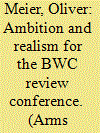

|
|
|
|
|
| Publication |
2011.
|
| Summary/Abstract |
Paul van den IJssel, the Dutch ambassador to the Conference on Disarmament, is president-designate of the 2011 Biological Weapons Convention (BWC) Review Conference, which is scheduled to take place December 5 to 22. He is a career diplomat in the Dutch Ministry of Foreign Affairs.
Van den IJssel spoke with Arms Control Today by telephone from Geneva on September 30 about the upcoming review conference. He said he was seeing a "convergence of views" on many of the key issues, but emphasized that there still is much work to be done to close the remaining divisions on technical and political issues.
|
|
|
|
|
|
|
|
|
|
|
|
|
|
|
|
| 2 |
ID:
023355
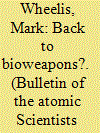

|
|
|
|
|
| Publication |
Jan/Feb 2003.
|
| Description |
41-46
|
|
|
|
|
|
|
|
|
|
|
|
|
|
|
|
| 3 |
ID:
110600
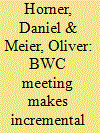

|
|
|
|
|
| Publication |
2012.
|
| Summary/Abstract |
The 2011 Biological Weapons Convention (BWC) Review Conference ended Dec. 22 with participants generally saying they were satisfied with the consensus agreement on a final document but with many expressing some disappointment that the conference failed to adopt significant changes in the treaty regime.
|
|
|
|
|
|
|
|
|
|
|
|
|
|
|
|
| 4 |
ID:
190212
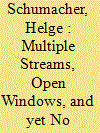

|
|
|
|
|
| Summary/Abstract |
Article VII of the Biological Weapons Convention (BWC) requires states to provide emergency assistance in the case of a deliberate bioweapons attack on any state party to the convention. Since no operational mechanism defining how to request or provide such assistance has yet been established, the painful lessons of the 2014–2016 West African Ebola crisis returned this topic to the agenda of the BWC. This study uses multiple streams analysis to investigate the impact of the Ebola crisis on the considerations of Article VII. While it revived the three streams of the debate—problem, policy, and politics—and opened a policy window, nevertheless, no political entrepreneur was able to couple the streams to produce policy output. As this window of opportunity begins to close, the Covid-19 pandemic seems to be the next focusing event shaping the BWC discourse on emergency assistance.
|
|
|
|
|
|
|
|
|
|
|
|
|
|
|
|
| 5 |
ID:
131241
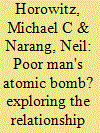

|
|
|
|
|
| Publication |
2014.
|
| Summary/Abstract |
The causes and consequences of nuclear proliferation have received a great deal of academic attention. However, nuclear weapons are rarely discussed in isolation in policy circles. Instead, nuclear weapons are relevant as part of a category of weapons of mass destruction (WMDs) that includes chemical and biological weapons (CBWs). Are the factors that drive CBWs proliferation similar to those that drive nuclear proliferation? What is the relationship between these weapons types? In this article, we explore whether nuclear weapons and CBWs serve as complements or substitutes. Using newly collected data on both CBWs pursuit and possession over time, we find that nuclear, biological, and chemical weapons generally function as complements at the pursuit stage. In addition, countries that acquire nuclear weapons become less interested in pursuing other types of WMDs and are even willing to give them up in some cases.
|
|
|
|
|
|
|
|
|
|
|
|
|
|
|
|
| 6 |
ID:
156331
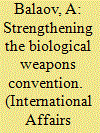

|
|
|
|
|
| Summary/Abstract |
BIOLOGICAL (bacteriological) weapons were the first category of weapons of mass destruction to come under a universal international legal ban. The Biological Weapons Convention (BWC) came into force back in 1975.
|
|
|
|
|
|
|
|
|
|
|
|
|
|
|
|